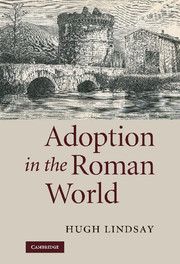Book contents
- Frontmatter
- Contents
- List of figures
- Preface
- List of abbreviations
- Introduction
- 1 Adoption, kinship and the family: cross-cultural perspectives
- 2 Kinship in Greece and Rome
- 3 Greek adoptions: comparisons and possible influences on the Roman world
- 4 Procedural aspects of Roman adoption
- 5 The testamentary adoption
- 6 Roman nomenclature after adoption
- 7 Adoption and inheritance
- 8 Roman freedmen and their families: the use of adoption
- 9 Adoption in Plautus and Terence
- 10 Sallust and the adoption of Jugurtha
- 11 Adrogatio and adoptio from Republic to Empire
- 12 Testamentary adoptions – a review of some known cases
- 13 Political adoptions in the Republic
- 14 Clodius and his adoption
- 15 The adoption of Octavian
- 16 Political adoption in the early Empire at Rome, Pompeii and Ostia; the imperial family
- Conclusion
- Glossary
- References
- Index
5 - The testamentary adoption
Published online by Cambridge University Press: 25 January 2010
- Frontmatter
- Contents
- List of figures
- Preface
- List of abbreviations
- Introduction
- 1 Adoption, kinship and the family: cross-cultural perspectives
- 2 Kinship in Greece and Rome
- 3 Greek adoptions: comparisons and possible influences on the Roman world
- 4 Procedural aspects of Roman adoption
- 5 The testamentary adoption
- 6 Roman nomenclature after adoption
- 7 Adoption and inheritance
- 8 Roman freedmen and their families: the use of adoption
- 9 Adoption in Plautus and Terence
- 10 Sallust and the adoption of Jugurtha
- 11 Adrogatio and adoptio from Republic to Empire
- 12 Testamentary adoptions – a review of some known cases
- 13 Political adoptions in the Republic
- 14 Clodius and his adoption
- 15 The adoption of Octavian
- 16 Political adoption in the early Empire at Rome, Pompeii and Ostia; the imperial family
- Conclusion
- Glossary
- References
- Index
Summary
Romans became very interested in the destination of their material goods, and this is well evidenced by the concerns of authors in the late Republic and early Empire. Property was generally devised by will, and this gave individuals an opportunity to express preferences for family members and others, and otherwise give utterance, usually from beyond the grave. Examples can be found, however, of individuals who preferred their dispositions to be common currency while they were still alive (Val. Max. 7.8.4); others such as Antony did not manage to keep their arrangements private until death. His will was seized from the temple of Vesta in 32 bc and read out in the Senate and assembly to damaging effect (Plut. Ant. 58.4–8; Dio 50.3.4; Suet. Aug. 17.1). When a ‘testamentary adoption’ was envisioned, it is not obvious whether the potential beneficiary habitually knew of this before the event.
The motives for wills are reviewed by Seneca in De beneficiis in a passage considered by Edward Champlin ([1991] 7):
When we stand at the very end of life, and set out our will, do we not divide up goods that are no boon to us at all? How much time is wasted, how long do we secretly ponder over how much there is and to whom we give it? What concern of ours is the recipient, when we will get nothing? Nonetheless, we never give more carefully, we never torment ourselves as much over our decisions … We seek out those most worthy to take over our possessions, nor do we arrange anything with more meticulous care than this matter which has no relevance to ourselves. […]
- Type
- Chapter
- Information
- Adoption in the Roman World , pp. 79 - 86Publisher: Cambridge University PressPrint publication year: 2009



